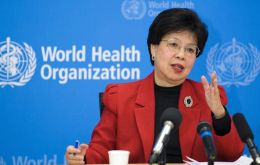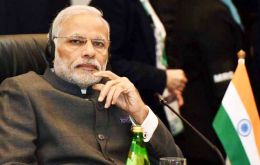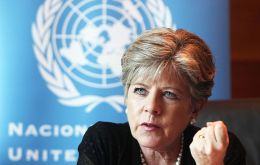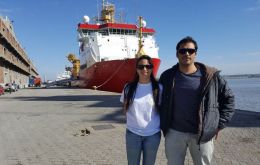MercoPress. South Atlantic News Agency
Stories for October 17th 2016
-
Monday, October 17th 2016 - 19:25 UTC
Historic agreement to phase down HFC gases in air conditioners and refrigerators

Negotiators from nearly 200 nations reached a historic deal to phase down emissions of hydrofluorocarbons (HFCs) — potent greenhouse gases used in air conditioners and refrigerators. The agreement, a major expansion of the 1987 Montreal Protocol, which eliminated the use of the ozone-depleting chlorofluorocarbons, was finalized during a United Nations meeting in Kigali, Rwanda.
-
Monday, October 17th 2016 - 19:02 UTC
TB remains the leading infection killer in the world; global efforts to end the epidemic are falling far short

New data published by the World Health Organization (WHO) in its 2016 Global Tuberculosis (TB) Report show that countries need to move much faster to prevent, detect and treat the disease if they are to meet global targets. Governments have agreed on targets to end the TB epidemic both at the World Health Assembly and at the United Nations General Assembly within the context of the Sustainable Development Goals.
-
Monday, October 17th 2016 - 10:04 UTC
The Sunday Times reveals unpublished Boris Johnson's pro-Remain column

Current Foreign Secretary Boris Johnson said the UK remaining in the EU would be a “boon for the world and for Europe”, a previously unpublished newspaper column reveals. He wrote the column in February, along with a pro-Brexit article that was later published in The Telegraph. Boris Johnson subsequently became a leading figure in the campaign to leave the European Union.
-
Monday, October 17th 2016 - 09:57 UTC
“Spoiler” Uribe replies to the NYT editorial: “an offence to the millions of Colombians who voted NO”

Colombia's Democratic Center party founded by former president Alvaro Uribe criticized on Sunday The New York Times for a recent editorial accusing the ex head of government of “blocking” the peace process in the country and calling on him to act as “a true statesman”. The party said that the NYT editorial constitutes “an offence to the millions of Colombians” who voted against the terms of the peace accord between the government and the main guerrilla group, FARC.
-
Monday, October 17th 2016 - 09:47 UTC
BRICS summit, despite drawbacks ends optimistic and vows to deepen economic engagement

Amid fears of threats posed by protectionism, the BRICS countries have vowed to deepen economic engagement, tackle the global economic slowdown, and combat cross border terrorism. The leaders of the five emerging economies of Brazil, Russia, India, China and South Africa wrapped up a summit Sunday in Goa, in western India.
-
Monday, October 17th 2016 - 09:34 UTC
Global momentum to protect the Antarctic Ocean builds as international talks begin in Hobart

The Antarctic Ocean Alliance is calling on nations to secure the future of the Antarctic and Southern Ocean, at the Conservation of Antarctic Marine Living Resources (CCAMLR) currently meeting in Hobart, Australia. This week, representatives from 25 governments are gathering in Hobart to address three proposed marine protected areas, amounting to more than five million square kilometers of Antarctic waters.
-
Monday, October 17th 2016 - 06:53 UTC
Mercosur founding members share same economic model and are targeting trade accords, says ECLAC

Tensions inside Mercosur can be attributed to the fact that Argentina, Brazil, Paraguay and Uruguay share a development “economic model” which distances them from Venezuela, and are prepared to advance in trade negotiations with the European Union, and even with the Pacific Alliance. Venezuela on the other hand has as its main priority putting the deteriorated economy back on the growth track, according to the UN regional economic commission ECLAC, chair Alicia Barcena.
-
Monday, October 17th 2016 - 06:28 UTC
Uruguayan scientists on HMS Protector en route to Antarctica for a joint research project

Two Uruguayan young scientists are on board Ice Patrol HMS Protector en route to the Falkland Islands and Antarctica and will be participating in a research program on human impact on the Antarctic marine environment including pollution mainly by plastic made products. Federico Weinstein and Carolina Rodríguez belong to the Faculty of Sciences and represent the resumption of long standing links between the Ice Patrol and Montevideo.
